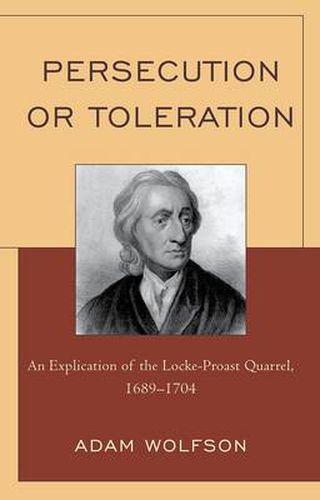Readings Newsletter
Become a Readings Member to make your shopping experience even easier.
Sign in or sign up for free!
You’re not far away from qualifying for FREE standard shipping within Australia
You’ve qualified for FREE standard shipping within Australia
The cart is loading…






This book traces, in detail, the complex contours of the Locke-Proast debate over the question of toleration-revealing the radical case John Locke made on behalf of toleration. Arguing against the pro-persecution arguments of Jonas Proast, Locke developed a broadly humanistic case for toleration rooted in liberal notions of consent, human dependency, and skepticism. Locke’s theory would extend to a wide range of religious believers and even atheists. However, at the same time, according to Locke, toleration requires an overcoming of the religious worldview, rather than an emergence out of theological assumptions, as many scholars argue. Ultimately, the success of toleration involves more than institutional reforms such as the separation of church and state or a mere modus vivendi among fighting faiths; it entails a shift in core religious beliefs and identities and a fundamental change in religious believers themselves. By undertaking a careful reading of the quarrel between Locke and Proast, this book furthers our understanding of the political alternatives of persecution, toleration, and pluralism.
$9.00 standard shipping within Australia
FREE standard shipping within Australia for orders over $100.00
Express & International shipping calculated at checkout
This book traces, in detail, the complex contours of the Locke-Proast debate over the question of toleration-revealing the radical case John Locke made on behalf of toleration. Arguing against the pro-persecution arguments of Jonas Proast, Locke developed a broadly humanistic case for toleration rooted in liberal notions of consent, human dependency, and skepticism. Locke’s theory would extend to a wide range of religious believers and even atheists. However, at the same time, according to Locke, toleration requires an overcoming of the religious worldview, rather than an emergence out of theological assumptions, as many scholars argue. Ultimately, the success of toleration involves more than institutional reforms such as the separation of church and state or a mere modus vivendi among fighting faiths; it entails a shift in core religious beliefs and identities and a fundamental change in religious believers themselves. By undertaking a careful reading of the quarrel between Locke and Proast, this book furthers our understanding of the political alternatives of persecution, toleration, and pluralism.